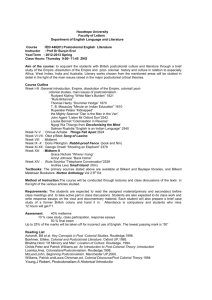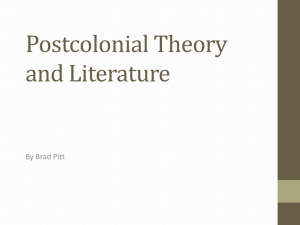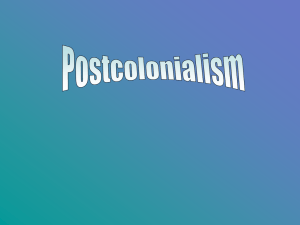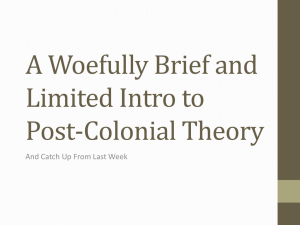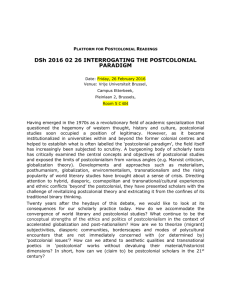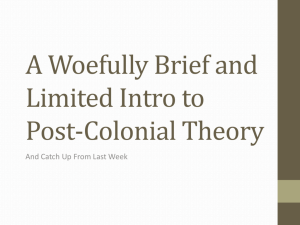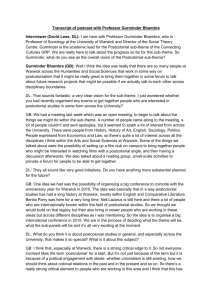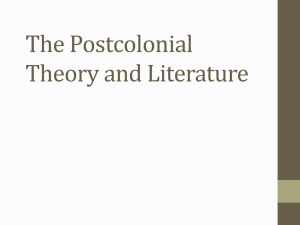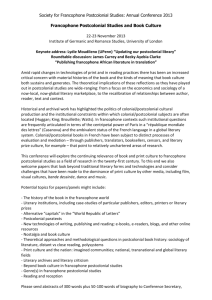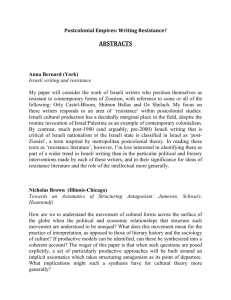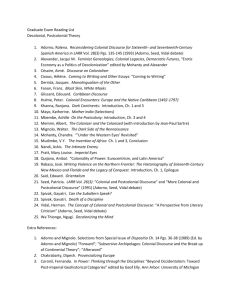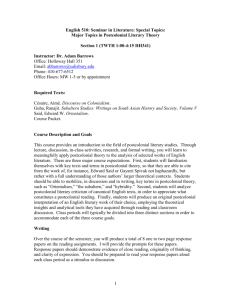Postcolonialism and its Critics
advertisement
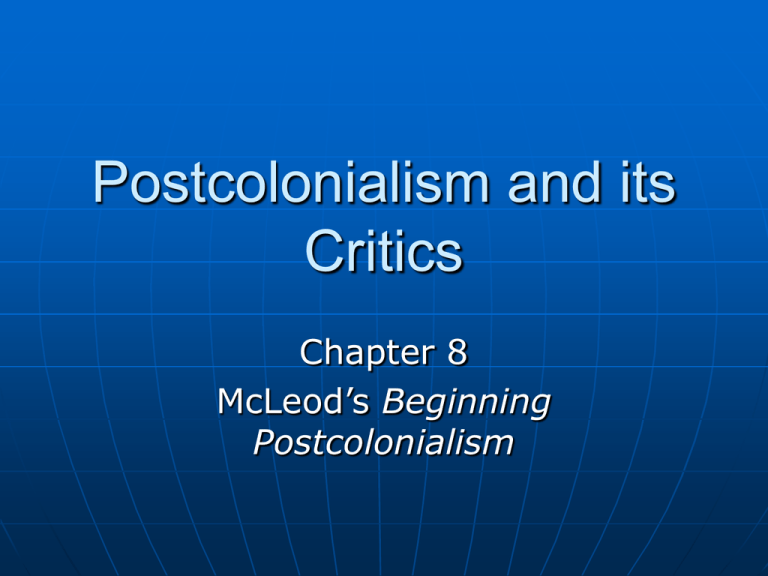
Postcolonialism and its Critics Chapter 8 McLeod’s Beginning Postcolonialism The debt to Western theory in postcolonialism • • • Because all postcolonial critics are products of Western universities and because they depend so heavily on Western philosophy – Freud, Lacan, Derrida, Foucault – the decolonized are being recolonized by Western theoretical imperatives. The colonies are providing the raw textual materials for processing by Western educated postcolonial theorists. All literature from the colonies is read through the lens of colonial (post/de/neo/re) issues. There is most certainly another theoretical angle that could (should) be applied. One answer to these criticisms is that there is no escape from history. A critic cannot move to an interpretation of the literature that does not include the colonial history. That would be to ignore reality. The critic needs to focus on the hybridity of the postcolonial nation’s history. The new “ghetto” of postcolonial literary studies • • Where do these texts and concepts get presented in literature courses? We’ve got whole courses on Shakespeare or the Romantics, very sharply focused and limited in their scope. Then, we’ve got postcolonial or nonwestern world literature. Look at the map, look at the timeframe. What does it say about what we privilege? Again, we colonize by division. How do we need to restructure/rethink our ideas about canon and about spheres of influence to shift the focus? Do we need to shift the focus? The problem of “antifoundationalism” • • Poststructuralist theory has broken down the difference between reality and textuality. Everything traditionally defined as “real” has become redefined as text, story, construct. Everything is story. All the stories which used to help us define ourselves – nationalism, Christianity, Marxism have been broken apart. For most intellectuals, this is a positive thing, promising more acceptance of the margins, multiculturalism, tolerance. How then, do the real contextual “facts” of peoples lives – different social and economic conditions – figure in? Is academia and academic theory too separated from these sorts of “facts”? See p. 251 quote from Dirlik. The issue of temporality • is postcoloniality post? • are all postcolonial experiences the same? • Isn’t it ongoing, a process, rather than a product? Isn’t Western multinational capitalism another form of colonization? When would we date the post? From which nation or movement’s independence? Is postcolonial African the same as postcolonial Australia? Is Japan postcolonial at all? What word would work better? Can you think of one? The relationship between postcolonialism and global capitalism Countries like Turkey, which were never colonized, or like Iran and Egypt which were occupied, but not colonized in the same way that India or Nigeria were, have been affected in terms of social and cultural figurations, in very similar ways to colonized nations. “[S]hould we speak, not so much of colonialism and postcolonialism, as of capitalist modernity”? (Ahmad) Postcolonial theorists and practitioners are complicit in this exploitation of labor and cultures because they don’t address it. The relationship between postcolonialism and global capitalism Postcoloniality is a matter of class, but issues of class remain absent from the agenda of much postcolonial theory. One critic Dirlik, claims that “postcolonial intellectuals are actually trying to hide their complicity with global capitalism.” He claims that postcolonial intellectuals “avoid making sense of the current crisis and, in the process, . . . cover up the origins of postcolonial intellectual in a global capitalism of which they are not so much victims as beneficiaries.” He posits that capitalist interest in transnationalism and multiculturalism, looking for ways to deal with difference and cultural otherness, assists capitalism in establishing itself in different places at different times. The relationship between postcolonialism and global capitalism Is Dirlik, perhaps a little paranoid? Can you see Spivak and Bhabha and Said sitting in a hotel room together shredding their IBM sponsored expense account receipts? Is it possible to see that, while we are all connected in the global environment of today’s business, we are not all complicit? That some of us might be resisting? Postcolonial critics do seem to be quite aware of and vocal about the problems caused by multinational capitalism.
